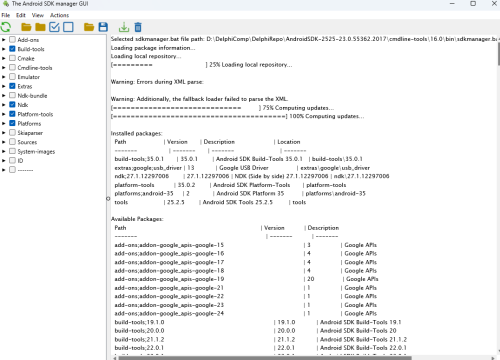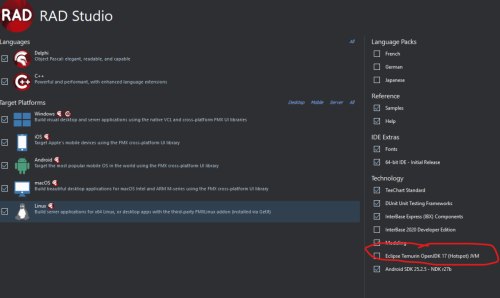

DelphiUdIT
-
Content Count
777 -
Joined
-
Last visited
-
Days Won
17
Posts posted by DelphiUdIT
-
-
I'm pretty sure that this is the correct driver (runtime) that should be used to connect with "mdb or accdb" using OLEDB or ODBC: https://www.microsoft.com/en-us/download/details.aspx?id=54920
Connection strings are noted in the page linked.
With OLEDB you can use: " Microsoft.ACE.OLEDB.12.0" or " DAO.DBEngine.120"
This was reported by an Italian guy who used it with Lazarus/FPC.
P.S: I haven't used access in over 20 years, so I can't provide any further help.
-
8 hours ago, Die Holländer said:Also for FireDac you need at least Delphi Enterprise. (Professional only FireDac local/embedded databases)
One can use also third party packages like ZeosLib instead of FireDac ..... but for Linux compiler there is no chance.
-
I don't think that Delphi RIO Professional Edition had supported Linux apps (not server, not gui). It can support Mac, IOS, Android, but not Linux.
And there is no more support for that release: https://docwiki.embarcadero.com/Support/en/Supported_Versions
I see few options, in my opinion the best solution should be update some licenses to the new version.
P.S.:
 the new version 12.3 Prof. Ed. doesn't support Linux too .....
the new version 12.3 Prof. Ed. doesn't support Linux too .....
-
Try this: https://docwiki.embarcadero.com/RADStudio/Athens/en/Programming_with_Delphi_Index
Look at "Type of Controls".
There is also the offline version inside RAD IDE.
-
You are using Indy component, and bundle version (like actually github too) distribuited with Delphi is able to use the openssl 1.0.2u version.
If you want to use the new SSL (3.x) now , there are additional components for Indy like that distribuited on GETIT, for examples TAURUSTLS.
-
 1
1
-
-
... and write all sources in YAML format, no ?
-
 1
1
-
-
Here there are new chm offline help files: https://docwiki.embarcadero.com/docs/products/rad_studio/
-
 1
1
-
 4
4
-
-
3 hours ago, Ian Branch said:Hmm. I see where you are coming from but there multiple cases sof LongInt variables in multiple Units that will need to be changed.
I will give it some thought.
Hmmm. If I going that far, perhaps I could use NativeInt...
Like @PeaShooter_OMO said, the parameter WPARAM is UINT64. So longint (signed 32 bit) and "unisgned 64 bit" are not a good combination.
-
"FY" is longint (signed 32 bit) and the parameter of SendMessage (WPARAM) is
nativeint (signed 64 bit). nativeuint (unsigned 64 bit)May be with the internal conversion (32 -> 64) and + 1 sometimes something wrong occurs. It's the case when FY = -1 ?
As workaround try to define FY as
INT64.UINT64.It's something that needs more accurate investigation ...
EDIT: correct thanks to PeaShotter
-
-
I will write in that way, I mean that I add identation for everything is inside the class definition.
I find it very comprensive simple to view, with very long definition too.
But surely it is 'cause I'm old ...
type TClass = class(TObject) private const SomeConstant = 5; SomeOtherConstant = 6; private type SomeType = integer; SomeOtheType = string; private class var SomeClassVar: integer; class var SomeOtherClassVar: string; private FSomeField: integer; end; -
46 minutes ago, PeterPanettone said:Maybe hacking NSA databases could disclose my position?


May be not, if you are under 3 or 4 VPN with a random rotation IP. You will be in 10 positions at the same ...
-
There are many ways to "find" your location. Some involving Windows and others not.
May be Windows put some of them in the privacy "contour" now.
It's like filtering a DNS, if the OS (or even the provider) want to catch and filter the normal DNS request ... they can do now, never or in the future (until you use some private DNS services).
Now you don't have any advise about DNS, but in the future may be you'll have some advise if Windows choose to filter it.
I had the WIndows location service not active, there is no reason to activate it in my PC. Normally I know where I am ....


-
Try a look at this:
-
-
I don't know if there is difference, but have you tried to use:
"C:\Program Files (x86)\Windows Kits\10\App Certification Kit\signtool" -
From embarcadero official docs https://docwiki.embarcadero.com/RADStudio/Athens/en/What's_New:
QuoteDelphi Exporting the uses Graph in a GraphViz file
The Delphi compiler has a new feature to help users understand the structure of a project and avoid unneeded circular unit references, which can slow down compilation and cause negative side effects on the compiler itself when combined with other language features. The ability to generate a uses statement graph directly at the compiler level (without a separate parsing tool) can be useful in many other scenarios, in general, to understand the structure of an application.
May be this is ?
-
26 minutes ago, Patrick PREMARTIN said:I've just installed the Android SDK manager GUI from GetIt and it worked fine.
I don't have Android Studio or VS Code in my VMs. Do you have any of them or an other development tool ?
I work with real machine not VM, and I don't have Android Studio installed.
That tool works and show me the same window, but after install the USB driver (in Extras may be) it stopped works.
I use a personal path for Catalog Repo (no UTF chars) ...
But it's not a real problem for me. You can do the same with other means.
EDIT:
UPDATE: I used the old "Android SDK Tools" and delete the USB Driver. Now the new Embacadero tool is working again ... 🙂Install again the USB driver ... the Embarcadero tool seems to still works ... (with some graphic glitch about old Anroid tools).
-
3 minutes ago, dtpfl said:This error appeared since 12.3,by default it doesnt work, refreshing libraries also didnt fixed the issue! The new Android Manager also dont work
Yes, this is tue, after updating with that tool the USB driver, it (the tool) doesn't work anymore ... same issue.
But of course you can use the command line to install other sdk platforms.
On 8/4/2024 at 3:23 PM, Magno said:java.lang.UnsupportedClassVersionError: com/embarcadero/dexer/Main has been compiled by a more recent version of the Java Runtime (class file version 61.0), this version of the Java Runtime only recognizes class file versions up to 52.0
This is because when you used something from Embarcadero (but if try to update Android platforms was the same) your Windows environment was setting for Java version less the 17. JDK, JRE,SDK or like you want to call them MUST BE version 17 or upper to managed class file version 61.
In this case the error seems to say you had active Java SDK version 8.
I normaly used to set this two environment "variables" and I never had problem with JAVA or Android SDK:
QuoteJAVA_EXE=C:\Program Files\Common Files\Oracle\Java\javapath\java.exe
SKIP_JDK_VERSION_CHECK=1
Of course with the correct personal path and be sure the you have Java version upper or equal to 17 (by now, in the future will see).
-
 2
2
-
-
The ISO also install all that you see in the previous post.
One time only, some years ago, in a fresh VM I had to install some prerequisites packages before (Vc++ 2015 redist, .net 4.5 and jdk).
I always used ISO to install Rad Studio.
-
I can confirm that UTF8 will be saved with BOM, certainly in the 12.3 editor.
-
-
It's always the 17th (it was as option to install). But I use Oracle SDK version 22th. I don't install other JDK.
And I install the new SDK / NDK without problem. Like always you should install other SDK version by hand.
Set in the Windows Environment :
QuoteSKIP_JDK_VERSION_CHECK=1
Sò no check will be done.
-
TRecordLoader<T> = class sealed class function Get: T; static;
If you use full generic declaration it works.
![Delphi-PRAXiS [en]](https://en.delphipraxis.net/uploads/monthly_2018_12/logo.png.be76d93fcd709295cb24de51900e5888.png)



Int, Frac functions and NaN value
in RTL and Delphi Object Pascal
Posted
With 12.3 Enterprise I cannot replicate any of these issues. Not even with evaluation panel.